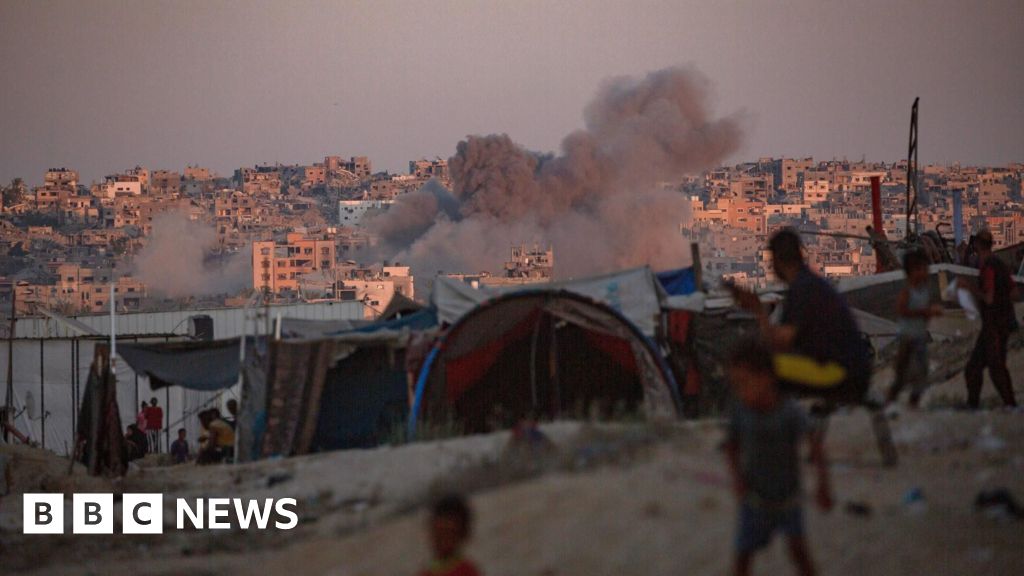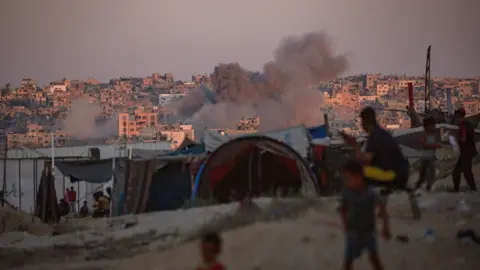 Reuters
ReutersIf the leaks to local papers are true, even Israel’s defence chiefs are urging Prime Minister Benjamin Netanyahu to make a deal and agree a ceasefire in Gaza.
Since Israel’s negotiators last made the trip to the Qatari capital for talks, the stakes – and the pressures – have only grown.
In Israel, the relatives of hostages still held in Gaza are calling this the “last chance” to get some of them out alive.
In Gaza, the Hamas-run health ministry – whose figures have been used by the UN and Israel in the past – says the number of people killed in Israeli operations there since the war began has now passed 40,000.
And the US is moving a second aircraft carrier and a missile-equipped submarine to the region, after threats from Iran and its Lebanese ally, Hezbollah, to attack Israel in response to the assassinations of key Hamas and Hezbollah leaders last month.
There is no lack of incentives for a deal.
And no lack of pressure either. The US believes a truce in Gaza could help calm the entire region.
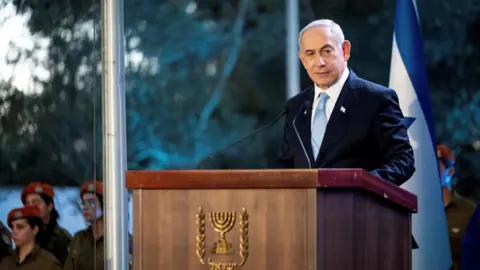 Reuters
ReutersVisiting Lebanon on Wednesday, US envoy Amos Hochstein said a deal would also help create the conditions for a deal in a growing cross-border conflict between Israel and Hezbollah.
“We have to take advantage of this window for diplomatic action and diplomatic solutions,” he said. “That time is now.”
His boss, President Joe Biden, appears to be managing expectations. “It’s getting harder,” he told reporters in New Orleans this week, adding, “I’m not giving up.”
With so much to gain, why are hopes for these talks so thin?
First, the red herring: the declaration by Hamas that it would not send a delegation to the meeting is unlikely to have a major impact.
Negotiations have always been indirect, shuttle diplomacy – Hamas representatives do not talk directly to Israel or the US. And the group’s main international base is Doha, where talks are taking place, and where Qatari and Egyptian negotiators have an open channel of communication with them.
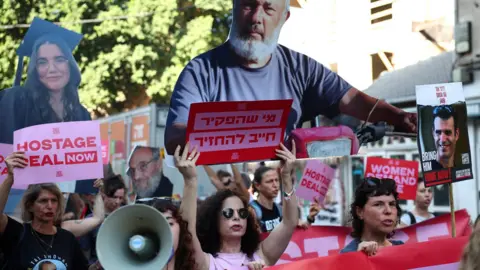 Reuters
ReutersThe real issue, according to former Israeli hostage negotiator Gershon Baskin, is a lack of motivation by the Israeli and Hamas leaders.
“The United States, Egypt and Qatar have decided that they need to change the rules of the game: put an ultimatum on the table, put a bridging proposal on the table, and tell Hamas and Israel that they have to do it,” he said.
“[But] it’s obviously that the mediators want the agreement more than the parties do, and that’s a big part of the problem.”
Chen Avigdori’s wife and 12-year-old daughter were among the 251 people kidnapped by Hamas in the 7 October attacks on Israel, when another 1,200 people were killed. The pair were released in November and he’s now campaigning to get the remaining 111 hostages out.
“I think they are both holding it up,” he said. “I think Sinwar doesn’t really care about his own people. But I think that Mr Netanyahu has skipped some opportunities that Israel already had to sign the deal.”
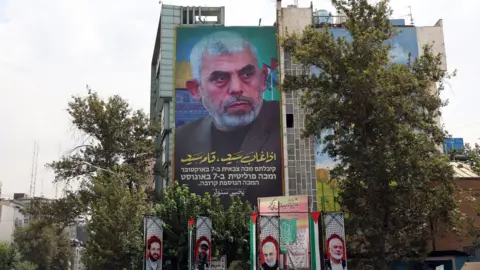 EPA
EPAFor Yahya Sinwar – one of the masterminds of the 7 October attacks, who became Hamas’s political leader following Ismail Haniyeh’s assassination in Tehran – some analysts believe the calculation may be changing.
“I think Sinwar wants to save himself and save Hamas, because they haven’t been destroyed totally, but militarily they’ve been defeated and it could turn into a rout,” said Chuck Freilich of Israel’s Institute for National Security Studies.
“Netanyahu is in a more difficult position, because if there’s a deal, there’s a very good chance that he’ll lose his coalition.”
Benjamin Netanyahu has so far held fast to certain red lines – including giving Israel the right to restart the war if later talks on troop withdrawal and prisoner exchanges fail.
Mr Netanyahu’s far-right allies have vowed to pull out of the government if, for example, he agrees to release large numbers of Palestinian prisoners from Israeli jails, in return for the hostages.
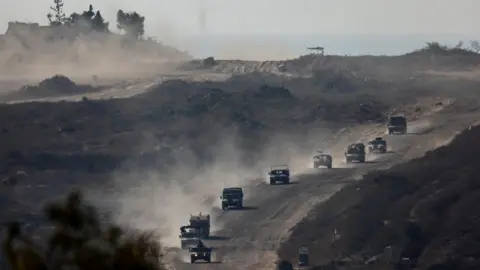 Reuters
ReutersThe sticking points facing negotiators are substantial. But proposals to bridge some of them have been widely reported in the Israeli media.
For instance, Mr Netanyahu’s insistence that Israeli forces must remain on Gaza’s border with Egypt, to stop armed groups smuggling in weapons, has been countered with solutions involving technology and the involvement of allies on the ground.
Hamas has accused Israel of bringing in new demands and said that the time for negotiation is over. It has said it is ready to implement the terms it agreed to last month. Israel denies it is adding new conditions, describing them as an attempt to clarify what was already agreed.
The deal’s international mediators – the US, Qatar and Egypt – certainly have some leverage over the two sides, but it may not be enough to force an agreement if the parties themselves don’t want one.
“The US and Qatar can push, they can cajole, they can offer inducements, they can offer to help create the technical solutions,” says Chuck Freilich. “But in the end, it’s up to the specific leaders.”
Ultimately, the fate of these talks, of Gaza, of the hostages – even the fate of the region itself – will rest on the calculations of two shrewd survivors; two warring men.

